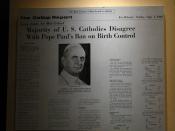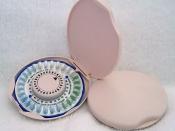Positive Contraception
Since the sexual revolution in the '60 women are taking more control over their bodies when it comes to contraception. Contraception has been a controversial topic among those for and against contraception. Traditionalists still hold on to their belief that birth control is unnatural. Women should remain abstinent until married, and ready to conceive. While liberals feel that women now have control over the right to choose how, and when they are ready to reproduce. Bottom line is that almost half of the 6.3 million pregnancies in the United States each year are unintended. Using some form of Contraception should be an available option as indicated in Sharing Responsibilities. Contraception has positive benefits, and should be used today to help prevent unwanted pregnancy.
Whether you side with the traditionalist or the Liberals, or you feel it is morally just or not. The fact is overall, 64% of the more than 60 million women aged 15-44 practice contraception, according to the National Survey of Family Growth (NSFG).
There are several different types of contraception that can be used to prevent pregnancy. Some of the newest methods are the monthly injection, the levonorgestrel intrauterine system, the combination hormonal contraceptive vaginal ring, and the transdermal contraceptive patch. All four new methods are effective, readily reversible, generally discreet, and reduce daily compliance challenges. However, according to the Food and Drug Administration (FDA), the most common forms of birth control are: male and female condoms which are 89% effective, and oral contraceptives (taken by the female) which are 98% effective. With these statistics many people, especially women, feel like they can be sexually active without running the risk of becoming pregnant. In the US Bureau of Census it states that there are 42million, or 7 in 10 women of reproductive age, are...


